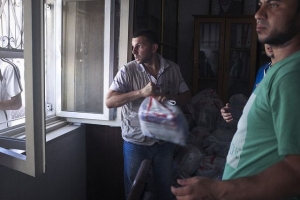
A staff member of Caritas Jerusalem taking delivery of aid in St Porphyrios Church before distributing it. © Virginie NGUYEN HOANG/hanslucas.com – Secours Catholique/ Caritas France.
Caritas staff in Gaza had been able to take advantage of a now dead ceasefire to deliver essential aid to the worst-hit areas. Now the fighting has resumed, it’s preventing Caritas reaching all those in need.
Israeli-Palestinian rocket fire resumed on Tuesday after Gaza truce talks broke down in Egypt.
“The return to conflict is limiting our movements,” said Mahmoud Majdalawi, a Caritas staff member working in Gaza. “We were able to take advantage of the ceasefire to reach some of the most damaged areas. In the badly-shelled Rafah in the south, we provided 900 blankets and 800 food packages [more are planned]. Now the truce is over, we can’t leave Gaza City.”
Since the conflict began on 8 July over 2000 people have been killed, including 470 children. During the Israeli ground and air offensive, Caritas was one of only a handful of aid agencies able to deliver help during the hottest phase of the crisis.
“We need a permanent ceasefire because the situation is terrible. We are faced with total destruction,” Caritas Jerusalem’s director Fr. Raed Abusahlia said to the Francisan Media Center. “We are counting on the prayers of the whole world. We believe the power of prayer is stronger than all the world’s armies.”
Caritas has provided 3000 people in two Greek Orthodox schools with food, powdered milk and hygiene items like diapers. Caritas has also supported handicapped and elderly people with 100 food parcels through the Catholic parish in Gaza.
Caritas has worked in 6 UNWRA schools, providing hygiene kits, food baskets and blankets . Through its medical centre, Caritas treated 115 women and children staying in the schools.
“During the truce people went back to their homes if they weren’t destroyed,” said Mahmoud Majdalawi. “Now they have returned to the shelters. They need the basic things like food and water. Everyone just wants peace. We want to be freed from the blockade. We want a normal life and not to live in this endless conflict.”
The Gaza Power Plant remains shut down, causing electricity outages up to 21 hours per day. Caritas has provided medical supplies and fuel to 2 hospitals, which otherwise would only have power 2-4 hrs a day.
With local donations from Jews, Muslims and Christians in Israel and the West Bank, Caritas Jerusalem has 10 trucks of in-kind donations. The first three of the trucks have already reached Gaza.
Church coordination
Catholic organisations meet once a week to divide up the work. Each takes a different are of work, like health, hygiene, basic needs, education.
Caritas member Catholic Relief Services is responsible for ‘non-food items’ . Of the 3,000 non-food-item kits procured, more than 1,800 have been distributed throughout the Gaza strip. Likewise, nearly 5,000 hygiene kits have been distributed throughout Gaza.
And 400 families have been provided with critical food assistance, non-food items, and clean water supplies, primarily through unconditional cash vouchers with the support of Caritas Germany.
